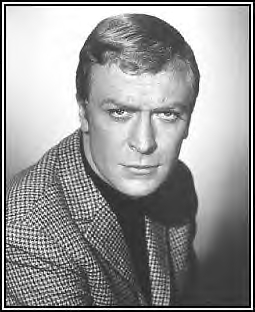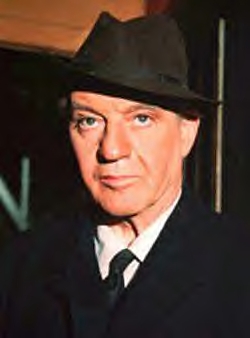| Reviews & Columns |
|
Reviews DVD TV on DVD Blu-ray 4K UHD International DVDs In Theaters Reviews by Studio Video Games Features Collector Series DVDs Easter Egg Database Interviews DVD Talk Radio Feature Articles Columns Anime Talk DVD Savant Horror DVDs The M.O.D. Squad Art House HD Talk Silent DVD
|
DVD Talk Forum |
|
|
| Resources |
|
DVD Price Search Customer Service #'s RCE Info Links |
|
Columns
|
|
|
Deadfall
Deadfall is one of three relatively obscure Michael Caine films to be released by 20th Century Fox this week (The Magus and Peeper are the other two -- click here for my Peeper review). While Deadfall isn't the total failure that Peeper was, it's certainly not a success, either. It's a languid, murky, psychological tease that's masquerading as a heist film, with one or two interesting performances, a good (if overrated) score by John Barry, and some stunning Spanish location work.

Henry Clarke (Michael Caine) is a master jewel thief, hiding out in an alcoholic sanitarium, trying to get close to his next mark, the wealthy, bored Salinas (David Buck). One day he's visited by Fe Moreau (Giovanna Ralli), who entices him, obliquely, with an offer to work with her and her husband on their next heist. After meeting Richard (Eric Portman), Clarke decides to work with them, partly because he's attracted to Fe. In turn, it's revealed that Richard as well is attracted to Clarke. What follows is a perverse game of sexuality and thievery, culminating in a stunning personal revelation that rocks this romantic triangle, and which disastrously affects the climactic heist.
Deadfall starts off intriguingly well (despite the Bondian rip-off theme song by Shirley Bassey) with Caine in the sanitarium. Director Forbes doesn't give away too much at the start, and we're challenged to try and figure out exactly what the relationships are between Caine and Salinas, as well as with Fe and Richard. Deadfall is one of those 1960s mainstream films that, stylistically, borrowed heavily from the European New Wave, but only as superficial window dressing - there's nothing innovative or revolutionary in the dramatics. Of course, you'd never know that from the trailer and original poster artwork, both of which heavily emphasized the taboo-breaking nature of the relationships in the film. Certainly, this was the time in film history where the major film studios were becoming ever more bold in what they portrayed on the screen. But just as assuredly, these pushes into the more explicit material were usually for exploitive reasons only, and even then, they were mostly teases and come-ons to the audience - they rarely, if ever, delivered the real goods (check out Valley of the Dolls for a good example of this).
SPOILER ALERT I'm not convinced that 1968 audiences were all that shocked by the notion that Eric Portman wanted to sleep with Michael Caine, any more than they were floored by the revelation that Portman was in reality Ralli's real father, and that they had enjoyed a sexual relationship in the past. These themes, while not commonplace in films at the time, were certainly not unheard of (or at least hinted at) at the local movie houses. As well, most audience members wouldn't have had a difficult time guessing this denouement by the time it rolled around; the screenplay makes much of the portentous, ominous nature of their relationship. There's something so obviously wrong with it (as well as a wealth of not-so-well hidden clues) that the filmmakers leave little choice for the audience but for them to go right to the most salacious conclusions concerning the couple.

SPOILER ALERT Director Bryan Forbes doesn't help this situation by consciously going for the "Euro-vague" tone of the film. Everyone's motives are hidden, and by the time they're revealed, the audience has ceased to care about them - the film is protracted at 120 minutes, and could have benefitted from some judicious pruning. There's endless shots of characters looking mysteriously at each other, while we try to guess their feelings. There's endless shots of characters isolated in the frame, staring mysteriously at something, while we try to guess what they're thinking. I don't particularly mind this type of navel-gazing filmmaking; it can be fun if there's some kind of pay-off at the end. Contemplation of beautiful-looking people in beautiful settings is fine - as long as it eventually means something. But Deadfall ultimately doesn't mean a thing. It refuses to clear up the central mystery of Portman's past Nazi activities; much agonizing is made of it by Caine and Ralli. They even introduce a character played by the great Leonard Rossiter who starts to clue us in on Portman, but then the filmmakers just drop the whole idea - and Rossiter (I suspect he was the victim, along with other major plot points, of severe post-production editing). As well, we're never given a clear understanding of exactly why Portman takes his own daughter for a lover, as well as his wife. If the filmmaker says, "Hey, that's up to you decide," then I respond, "Hey, work out your script problems on somebody else." I'm all for enigmatic filmmaking, if there's art involved. But Deadfall is pretentious psychiatric claptrap, wrapped around a heist film framework, and it doesn't deserve the benefit of the audience's doubt.
Much has been made about John Barry's score being "rediscovered" here (the liner notes on the DVD case make a big deal about it, as well as a full documentary devoted to the composer, included here). I'm a huge fan of Barry, and his score here is beautiful, but it's not the revelation that everyone would have you believe. In fact, if you're at all familiar with Barry's scores, it's somewhat derivative of some of his later Bond music (particularly some riffs in You Only Live Twice). I'll take derivative Barry over other composers any day, but Deadfall's score isn't an overlooked classic. Of particular note in the documentary on Barry is the discussion of the musical piece that accompanies the film's central heist. It's lovely music, and it does help the sequence, but director Forbes essentially botches the sequence by intercutting too much between the heist and the concert that's playing the same music. Eventually, you're saying to the screen, "Will you just show me Caine? I don't care about that bloody guitar player!" But that's indicative of Deadfall's central problem: pretentiousness. It's trying to be something it's not. It's trying to gussy up a fairly pedestrian heist sequence by intercutting a classical musical piece with it, and doing a disservice to both. It doesn't help, either, that director Forbes cheats on several important shots (conveniently when he's cutting over to that guitar player!) that reduce the scene to improbability (how, exactly, did Caine get that monstrously heavy safe out of the second story window? You'll never know, because Forbes won't show you). I do admit that I enjoyed Caine's "deadfall" move, even though it's wildly improbable. And on a picky note: I'm no safecracker, but wouldn't someone in that house have heard Caine whacking away at the brick wall with a sledgehammer, especially after Portman and Caine went to such great lengths to enter the house silently?
Caine is probably at the peak of his 1960s popularity here; unfortunately, by his own admission in his autobiography, he was taking any film project that came his way, regardless of worth, because he was afraid the party was going to end at any minute. He even goes so far as to say that he never even remembers signing a contract for Deadfall, and that he did it because others (presumably his management) insisted he do it. That might explain his impassive, unreadable face in Deadfall. He's clearly not engaged by the material; it's a shame he increasingly cluttered his career with slight material like this. Ralli doesn't have to do much except be alluring and mysterious, and she manages that, but only that. She brings nothing of depth to the proceedings. Eric Portman is the real pro, here. Despite the pretentious dialogue he's given in Deadfall, he walks away with each scene he's in. Quite frankly, I would have preferred the movie to be about his past, and his relationship with Ralli - you could lose the whole Caine subplot nicely, and have a whole lot more Portman in the film.

The DVD:
The Video:
Like 20th Century Fox's release of Peeper, Deadfall looks marvelous in a new widescreen print (the box lists it at 1.66:1, but it actually looked closer to 1.85:1 to me). The colors are strong, with little or no fading, and the Spanish locales truly are breathtaking. So often, we seem to see the same location shots in these European productions during the 1960s, but these gorgeous Spanish locales look unfamiliar, and they're all the more welcome for that quality.
The Audio:
The Dolby Digital stereo and mono soundtracks are strong and clear; John Barry's lovely score stands in the forefront of the movie's virtues. There's also a Spanish mono track, as well.
The Extras:
The John Barry Touch -- The Music of a Master is a fairly generalized bio on the master composer. It doesn't reach any profound conclusions about his work ("I think his music will be remembered." Uh......yeah), and even includes some clunkers, too. The author of a book on John Barry asserts that his score for Deadfall, a film that almost nobody saw, was instrumental in securing Barry's reputation in America. I would venture to guess that happened a few years earlier, when Barry's Goldfinger song burst on to the pop charts. The fact that the documentary makers enlist director Bryan Forbes to talk about Barry (and not the other way around), pretty much indicates where Forbes' reputation stands today. There's a theatrical trailer that emphasizes the salacious nature of the film (and makes it seem way more exciting than it is). As a bonus to fans, John Barry's score appears on an isolated track, but it pops up in real time as the film plays, so there's stretches of ten minutes or more where it's just silence -- which can be very annoying. I put it on in the background to listen to while I did other things, and after a half hour of hearing just one music cue, I turned the feature off.
Final Thoughts:
Deadfall doesn't cut it as a psychological thriller; its psychology is murky at best, while its thriller aspects are decidedly undernourished. If you dig Caine, I recommend you watch it to complete your Caine continuity. Its location work is beautiful to look at, and accompanied by a beautiful John Barry score, you could probably just groove along with the film, treating it as a good-looking travelogue. But unless you're a die-hard Caine fan, I recommend you rent it.
Paul Mavis is an internationally published film and television historian, a member of the Online Film Critics Society, and the author of The Espionage Filmography.


|
| Popular Reviews |
| Sponsored Links |
|
|
| Sponsored Links |
|
|
| Release List | Reviews | Shop | Newsletter | Forum | DVD Giveaways | Blu-Ray | Advertise |
|
Copyright 2024 DVDTalk.com All Rights Reserved. Legal Info, Privacy Policy, Terms of Use,
Manage Preferences,
Your Privacy Choices | |||||||













